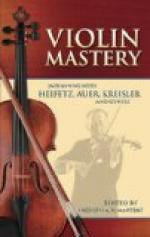“He never did write it,” said Mr. Hartmann, “but it was not for want of good will. As to other transcriptions, I have never done any that I did not feel instinctively would make good fiddle pieces, such as MacDowell’s To a Wild Rose and others of his compositions. And recently I have transcribed some fine Russian things—Gretchaninoff’s Chant d’Automne, Karagitscheff’s Exaltation, Tschaikovsky’s Humoresque, Balakirew’s Chant du Pecheur, and Poldini’s little Poupee valsante, which Maud Powell plays so delightfully on all her programs.”
VII
JASCHA HEIFETZ
THE DANGER OF PRACTICING
TOO MUCH.
TECHNICAL MASTERY AND
TEMPERAMENT
Mature in virtuosity—the modern virtuosity which goes so far beyond the mere technical mastery that once made the term a reproach—though young in years, Jascha Heifetz, when one makes his acquaintance “off-stage,” seems singularly modest about the great gifts which have brought him international fame. He is amiable, unassuming and—the best proof, perhaps, that his talent is a thing genuine and inborn, not the result of a forcing process—he has that broad interest in art and in life going far beyond his own particular medium, the violin, without which no artist may become truly great. For Jascha Heifetz, with his wonderful record of accomplishment achieved, and with triumphs still to come before him, does not believe in “all work and no play.”
[Illustration: JASCHA HEIFETZ, with hand-written note]
THE DANGER OF PRACTICING TOO MUCH
He laughed when I put forward the theory that he worked many hours a day, perhaps as many as six or eight? “No,” he said, “I do not think I could ever have made any progress if I had practiced six hours a day. In the first place I have never believed in practicing too much—it is just as bad as practicing too little! And then there are so many other things I like to do. I am fond of reading and I like sport: tennis, golf, bicycle riding, boating, swimming, etc. Often when I am supposed to be practicing hard I am out with my camera, taking pictures; for I have become what is known as a ‘camera fiend.’ And just now I have a new car, which I have learned to drive, and which takes up a good deal of my time. I have never believed in grinding. In fact I think that if one has to work very hard to get his piece, it will show in the execution. To interpret music properly, it is necessary to eliminate mechanical difficulty; the audience should not feel the struggle of the artist with what are considered hard passages. I hardly ever practice more than three hours a day on an average, and besides, I keep my Sunday when I do not play at all, and sometimes I make an extra holiday. As to six or seven hours a day, I would not have been able to stand it at all.”




